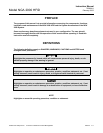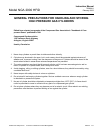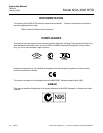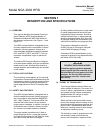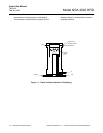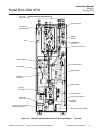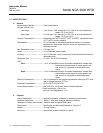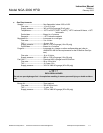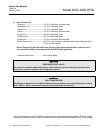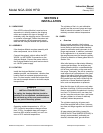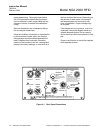
Instruction Manual
760004-A
February 2002
Rosemount Analytical Inc. A Division of Emerson Process Management Description and Specifications 1-1
Model NGA 2000 HFID
SECTION 1
DESCRIPTION AND SPECIFICATIONS
1-1 OVERVIEW
This manual describes the Heated Flame Ioni-
zation Detector (HFID) Analyzer Module of
Rosemount Analytical's NGA 2000 Series of
gas analysis components. See Figure 1-1 and
Figure 1-2.
The HFID Analyzer Module is designed to con-
tinuously determine the concentration of hydro-
carbons in a flowing gaseous mixture at a
user-selectable temperature setpoint between
93°C and 204°C (200°F and 400°F). The con-
centration is expressed in ppm or percent of
volume.
The entire HFID Analyzer Module is designed
as a stand-alone module, with gas connections
made from the rear. All electronics relative to
sample detection and conditioning are included
in this module.
1-2 TYPICAL APPLICATIONS
The monitoring of atmospheric air for low-level
hydrocarbon contaminants and determining the
hydrocarbon content of exhaust emissions from
internal combustion engines are examples of
typical applications for the HFID Analyzer Mod-
ule.
1-3 SAFETY GAS FEATURES
The HFID Analyzer Module is designed with a
factory-installed continuous dilution purge sys-
tem in accordance with standard ANSI/NFPA
496 - 1993, Chapter 6. Front-panel LEDs indi-
cate that the burner flame is lit and that the
purge system is enabled. In addition, fuel gas is
automatically shut off when a flame-out condi-
tion occurs or the safety system is disabled.
The purge system is enabled only if there is
proper purge gas flow in, purge gas pressure,
and internal case pressure, and after five times
the case volume has been exchanged.
All tubing ahead of the burner is rigid metal-
lic tubing assembled with ferrule/nut type
compression fittings. However, should an
internal fuel leak occur, a worst-case leak
would be dissipated below 25% of the LEL
of hydrogen through the combination of an
inlet fuel flow restrictor and purge gas flow.
This module is designed to use 40%
H
2
/60% He fuel at a maximum inlet pres-
sure of 3446 hPa-gauge (50 psig).
A standard HFID Analyzer Module is only
equipped to analyze a non-flammable sam-
ple, below 100% of the LEL.
WARNING
POSSIBLE EXPLOSION HAZARD
Protection against explosion depends
upon a special fuel flow restrictor in the
fuel inlet fitting. Do not remove fuel inlet
restrictor. Do not use 100% hydrogen
fuel. Replace only with a factory sup-
plied fitting.
1-4 THEORY OF TECHNOLOGY
This Analyzer Module uses the flame ioni-
zation method of detection. The sensor is a
burner in which a regulated flow of sample
gas passes through a flame sustained by
regulated flows of a fuel gas (a hydro-
gen/diluent mixture) and air.
Within the flame, the hydrocarbon compo-
nents of the sample stream undergo a com-
plex ionization that produces electrons and
positive ions. Polarized electrodes collect
these ions, causing current to flow through
an electronic measuring circuit.
The ionization current is proportional to the
rate at which carbon atoms enter the
burner, and is therefore a measure of the



